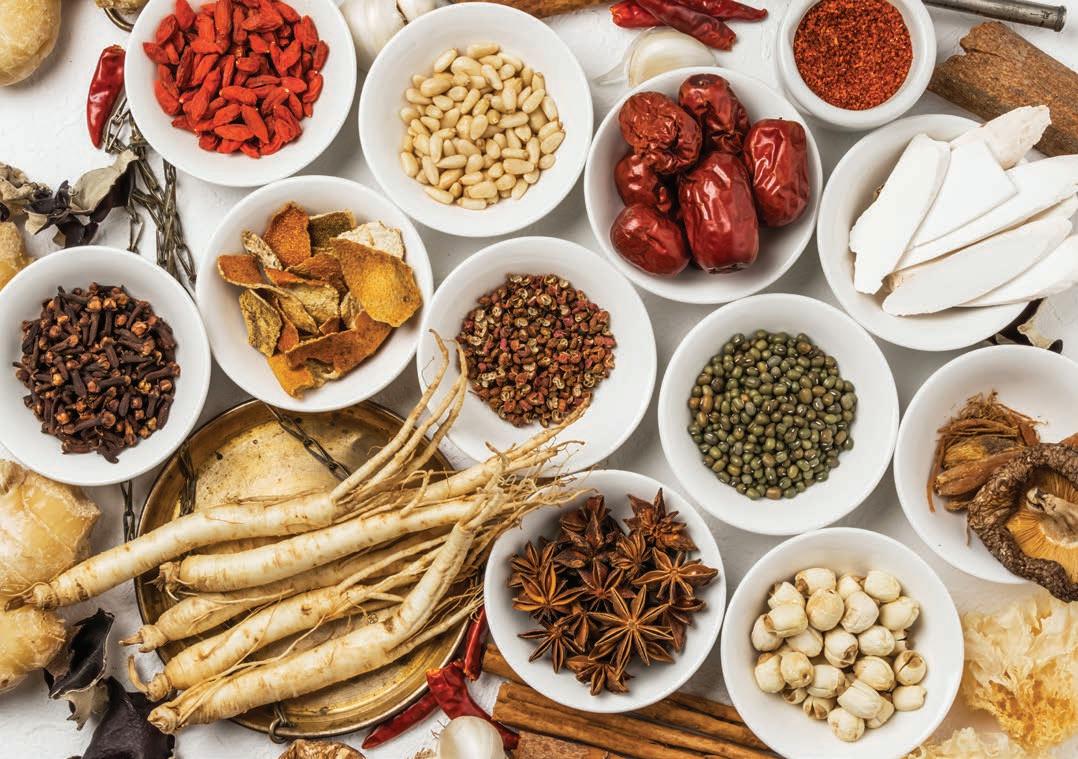3 minute read
FOODIE FIND
USING HERBAL SUPPLEMENTS SAFELY
Herbal supplements can interact with conventional medicines or have strong effects. Do not selfdiagnose, and talk to your doctor before taking them.
• Educate yourself. Learn as much as you can about the herbs you’re taking by consulting your doctor and contacting herbal supplement manufacturers for information.
• Follow label instructions carefully and use the prescribed dosage only. Never exceed the recommended dosage, and seek out information about who should not take the supplement.
• Work with a professional. Seek out the services of a trained and licensed herbalist or naturopathic doctor who has extensive training in this area.
• Watch for side effects.
If symptoms, such as nausea, dizziness, headache, or upset stomach occur, reduce the dosage or stop taking the herbal supplement.
• Be alert for allergic reactions. A severe allergic reaction can cause trouble breathing.
If such a problem occurs, call 911 or the emergency number in your area for help.
• Research the company whose herbs you’re taking. All herbal supplements are not created equal, and it’s best to choose a reputable manufacturer's brand.
Source: John Hopkins Medicine, hopkinsmedicine.org/health/ wellness-and-prevention/ herbal-medicine In addition, cinnamon decreases inflammation and provides astringent properties (thanks to its tannins and oils).



3CANNABIS Cannabis has been used for medicinal purposes for over 12,000 years and has an array of benefits, including longterm relief from inflammation, pain, stress, anxiety, and depression. Almost everyone can benefit from some form of cannabis and it even treats ailments like IBS, asthma, and ulcers. Cannabis comes in several forms like flowers, oils, edibles, balms, and tinctures. It provides a healthy and safe alternative to other medications without any potentially harmful side effects. CBD is the nonpsychoactive component of the cannabis plant that can be used daily to promote balance and homeostasis within the body.
4GINGER One of the most underutilized spices we have, ginger has myriad uses for all aspects of life and can be taken to treat colic, indigestion, excess gas, bloating, coughing, asthma, and even congestive conditions. Drinking ginger tea daily is thought to help with one’s respiratory tract and improve breathing.
5CINNAMON Employed for its smooth muscle relaxing effects and ability to help treat hypertension, bronchial spasm, painful menstruation, diarrhea, and IBS, cinnamon is indeed a super spice. The volatile oils in it are antibacterial, antifungal, and antiviral—making it an excellent agent to remedy colds and flus. 6 PASSIONFLOWER Passionflower is wellindicated in states of nervous tension and anxiety. It also has anti-spasmodic effects on smooth muscles, making it especially useful for diarrhea, hypertension, and asthmatic wheezing.
Because it’s so gentle, it’s considered a good herb for children and the elderly (when taken in moderation).
7OAT Oat is often used to aid people giving up tobacco or other addictive substances and is theorized to increase energy levels and one’s sense of well-being. It may be a useful agent in paralysis and weakness associated with aging and is also a nutritive relaxant. Taken over time, it will increase stamina and strength.
Oatmeal baths, compress, and poultices are often recommended to relieve inflammation and itching caused by insect bites, eczema, varicella, topical fungal infections, and contact dermatitis.
Contributed by Revolutions Naturopathic, 230 Blue Ravine Road, Folsom; 254 Gibson Drive, Roseville, 916-351-9355, revolutionsdocs. com (Source: ‘Principles and Practice of Phytotherapy: Modern Herbal Medicine’ by Kerry Bone and Simon Mills); Manas Kshirsagar, AD, MS, at Serenity Spa | Soul Yoga, 3984 Douglas Boulevard, Suite 150, Roseville, 916-797-8550; 350 Palladio Parkway, Suite 1975, Folsom, 916-542-7363, serenityspaonline.com; and Dana Caylor, training director at KOLAS University, 1215 G Street, Sacramento, 916-465-6527, kolas.com Cinnamon photo Copyright: Anton Ignatenco dionisvera@gmail.com. Oat photo ©Andriy Petrenko - stock.adobe.com. Passionflower photo ©Harry - stock.adobe.com. Cannabis photo ©Elroi - stock.adobe.com.
More articles from this publication:
from Style Magazine - Roseville, Granite Bay, Rocklin Readers' Choice Awards - October 2021
, page 78

INTRODUCING
from Style Magazine - Roseville, Granite Bay, Rocklin Readers' Choice Awards - October 2021
, page 76

KEEP IT LOCAL
from Style Magazine - Roseville, Granite Bay, Rocklin Readers' Choice Awards - October 2021
, page 91

EAT & DRINK
from Style Magazine - Roseville, Granite Bay, Rocklin Readers' Choice Awards - October 2021
, page 54

GIVING BACK
from Style Magazine - Roseville, Granite Bay, Rocklin Readers' Choice Awards - October 2021
, page 46

COMMUNITY MATTERS
from Style Magazine - Roseville, Granite Bay, Rocklin Readers' Choice Awards - October 2021
, page 60

ARTS & CULTURE
from Style Magazine - Roseville, Granite Bay, Rocklin Readers' Choice Awards - October 2021
, page 74




